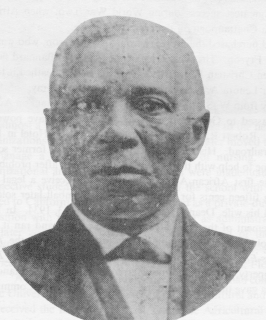 Knoxville's
first black taxpayer was an industrious individual who was active in
various civic and charitable causes. He was an ex-slave, city policeman,
educator, and a founder of one of the city's oldest black churches.
Knoxville's
first black taxpayer was an industrious individual who was active in
various civic and charitable causes. He was an ex-slave, city policeman,
educator, and a founder of one of the city's oldest black churches.
James Mason was born in Knoxville about 1840 and was owned by Major James Swan. As a young man, he was the Major's favorite servant and valet. His duties were to look after the master and his horses.
Mason was fortunate that a young member of the Swan household taught him to read. Although teaching slaves was forbidden in many areas, that was not the case in Knoxville, where free blacks soon outnumbered slaves. Mason also was given the opportunity to earn money on other jobs when not needed by the Swans.
Mason eventually was given his freedom. He continued to work and save his money, in hopes of buying his wife's freedom. He had married Betty Fountain, a young slave woman. With the coming of Emancipation, however, purchasing the freedom of his wife was not necessary. He used his savings to buy a house and lot on West Cumberland Avenue in 1866, thus becoming the city's first black property owner and taxpayer. In 1865, he had become a charter member of Shiloh Presbyterian Church.
One of Mason's chief concerns was the plight of deaf black children in Tennessee. As early as 1852, the board of trustees for the Tennessee School for the Deaf had been petitioned to admit a black pupil. The request fell on unbearing ears. In 1879, Mason established a school for deaf children in his home. On April 4, 1881, the state legislature passed a bill establishing a school for black deaf children, with an appropriation of $2,500 for two years. The first session of the school opened with ten pupils, who were initially placed in Mason's home. They ate their meals in a log cabin, slept in another building, and went to yet another part of the city for school work. This arrangement went on until the summer of 1883, when the students were moved to a site on Dandridge Avenue.
In 1885, the Tennessee General Assembly appropriated money to purchase the property and repair the buildings. By 1945, the school grounds had increased to almost 100 acres and was serving twenty students.
Mason did not live to see the fruits of his labor manifested in the success of the school for the state's black deaf children, but he had dared to dream and take the initial steps for what was to come. While deeply involved in working for deaf children and his church, Mason made his living as a city policeman. He became Knoxville's second black policeman in 1884 and served honorably until his retirement in 1902.